Oh Mickey, you’re so fine—but you’re not alone: An avalanche of copyrighted works will enter the public domain in the United States on January 1, 2024. Here’s what it all means.
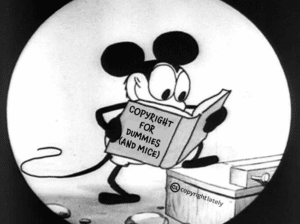
Yes, yes, Steamboat Willie will enter the U.S. public domain on January 1, 2024—and that’s a shame. Before you accuse me of being some sort of Disney shill, I’m not advocating for longer copyright terms. It’s just that the liberation of Mickey Mouse 1.0 has been sucking up so much media oxygen that we risk overlooking hundreds of other prominent creative works that will become copyright-free when the clock strikes twelve on December 31, 2023.
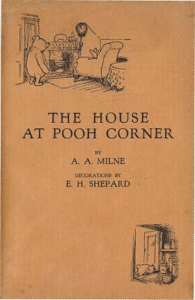
Don’t worry, Mickey will get his due, but let’s not forget that 2024 will also see U.S. copyright protection lapse for A. A. Milne’s The House at Pooh Corner, which introduced Tigger to the Hundred Acre Wood, the groundbreaking musical play The Threepenny Opera (along with the German version of its signature song “Mack the Knife“), and J. M. Barrie’s play Peter Pan; or, the Boy Who Wouldn’t Grow Up.
Lights of New York, the first all-talking full-length feature film, will also enter the U.S. public domain in 2024, as will Edgar Rice Burroughs’ novel Tarzan, Lord of the Jungle, and Wanda Gág’s Millions of Cats, which is the oldest American picture book still in print.

Happy Public Domain Day 2024
NEW—Copyright Lately‘s deep dive on Public Domain Day 2025 is up now!
Millions of Cats will be joined by thousands of other popular books, movies and musical compositions first published in 1928 that are nearing the end of their 95 year U.S. copyright terms. For the first time in two years, sound recordings (those first published in 1923) will also enter the public domain.
One of the most notable films entering the public domain on January 1, 2024, is Carl Theodor Dreyer’s silent masterpiece The Passion of Joan of Arc. Dreyer shot harrowing close-ups of star Renée Jeanne Falconetti to reenact Joan’s trial for heresy, which ended with her burning at the stake in 1431.
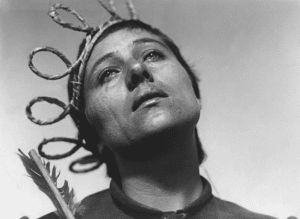
Ironically, the film’s original cut was destroyed in a fire just six weeks after its 1928 premiere and was thought lost to history until 1981, when someone discovered a print in a janitor’s closet at a Norwegian mental institution. Echoing the film’s resurrection, the copyright in The Passion of Joan of Arc once lapsed, only to be revived in 1996 by the Uruguay Rounds Agreements Act. That law restored copyright protection for foreign works that were still protected by copyright in their source countries, but which had fallen into the U.S. public domain for failure to comply with the various formalities (e.g., notice, registration, and renewal) formerly imposed under U.S. law.
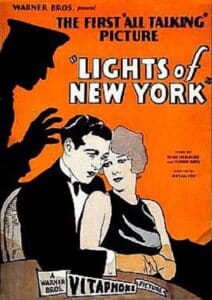
Other historically significant works entering the public domain in 2024 include Virginia Woolf’s Orlando: A Biography (a pioneering novel known for its exploration of gender fluidity), Coming of Age in Samoa: A Psychological Study of Primitive Youth for Western Civilisation by Margaret Mead (a seminal work in anthropology which challenged Western perceptions of sexuality), and Radclyffe Hall’s The Well of Loneliness (a groundbreaking exploration of gender identity).
I’ve listed dozens of other notable works entering the public domain at the end of this article. However, as always, Public Domain Day 2024 will be accompanied by lots of caveats, asterisks and traps for the unwary. Here’s what you need to know to celebrate responsibly.
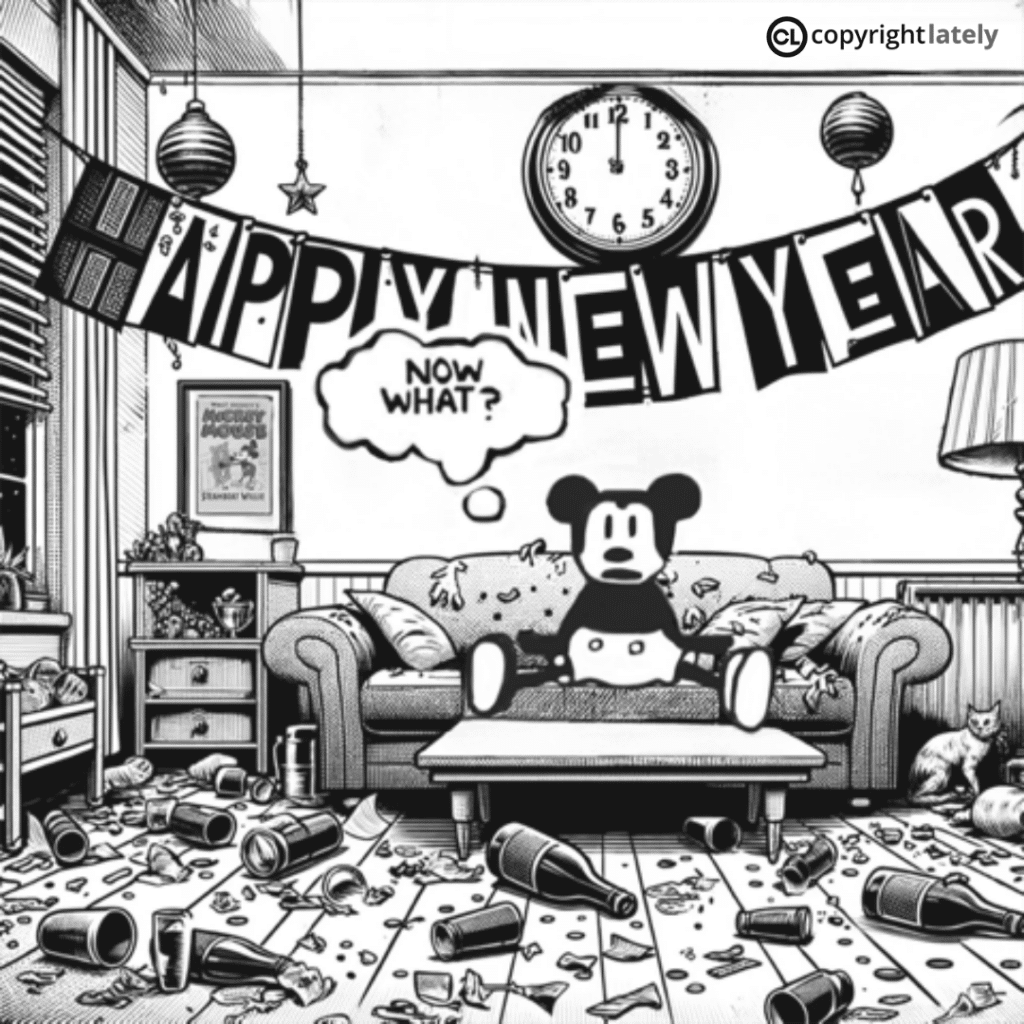
Derivative and Foreign Works
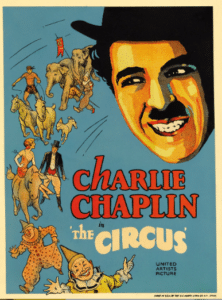
Remastered, rescored, translated, or otherwise revised editions often present a challenge for those looking to use public domain works without inadvertently stepping on subsisting copyrights.
For example, while The Passion of Joan of Arc will re-enter the U.S. public domain on January 1, director Dreyer never chose a definitive musical score for the film. As a result, several versions are floating around that feature later-added scores, and they may still be protected by copyright. Likewise, while the original 1928 Charlie Chaplin silent comedy The Circus will enter the public domain in 2024, the film was re-released in 1969 with a new score by Chaplin, and that version is still protected.

Erich Maria Remarque’s classic 1928 anti-war novel All Quiet on the Western Front will enter the public domain on January 1, 2024—but only the original German version. The U.S. translation by A.W. Wheen will remain protected until January 1, 2025. All Quiet on the Western Front also continues to be protected in Germany and other countries whose copyright terms last for 70 years after the author’s death, which includes most of the world. The United States now uses a life + 70 copyright regime, but only for works created on and after January 1, 1978. Confused yet?
D.H. Lawrence’s salacious 1928 novel Lady Chatterley’s Lover presents another example of the long and winding journey foreign works may face on the road to the public domain. Explicit sexual descriptions and profanity prevented Lawrence from publishing the uncensored version of his book in his native England; the author instead privately published one thousand copies in Italy, which he then distributed to his subscribers in the U.K.—and likely to the U.S. as well.
However, as these copies were published without a copyright notice, they immediately fell into the public domain in the United States. Meanwhile, by 1929, the U.S. government had declared the novel legally obscene, with the Post Office confiscating any copies found circulating in the mail.
A censored version of Lady Chatterley’s Lover was published in 1932, but the original unexpurgated 1928 version wasn’t legally published in the U.S. until 1959, when a federal district court ruled that the novel was not, in fact, obscene.
Still, the public domain status of the uncensored edition has been the subject of confusion as a result of retroactive extensions to the length of U.K. copyright terms, coupled with questions over the applicability of the URAA’s Copyright Restoration Act on the book’s U.S. copyright. The confusion will end on January 1, 2024, when the original unexpurgated version of Lady Chatterley’s Lover will fall firmly and finally into the U.S. public domain.
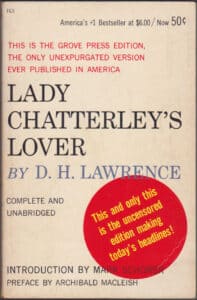
IMPORTANT Public domain is country-specific. Just because a work is in the public domain in the United States doesn’t mean it’s not protected by copyright elsewhere—and vice versa. For more information, check out the Copyright Myth Project.
The Copyright That Wouldn’t Grow Up
J. M. Barrie’s Peter Pan presents another interesting example of the often thorny and byzantine copyright issues involving older works. While Barrie’s 1911 novel is in the public domain, the original play on which it was based (Peter Pan; or The Boy Who Wouldn’t Grow Up) wasn’t officially published until 1928. Never mind that the play had been performed thousands of times dating back to 1904; this didn’t constitute a “publication” that triggered early twentieth-century U.S. copyright formalities. As a result, the play’s U.S. copyright is only now expiring—120 years after its first performance.

Barrie’s decision to withhold publication of the play was serendipitous for London’s Great Ormond Street, a hospital for sick children to whom Barrie unconditionally assigned his Peter Pan copyright in 1929. The hospital has collected royalties for U.S. performances of the play for nearly one hundred years, even though the novel’s U.S. copyright expired in 1967. Because the play’s publication was delayed, it was still protected in 1978 when Congress extended the terms of existing copyrights from 56 years to 75 years.
The play’s trip to the public domain was further delayed by 1998’s Sonny Bono Copyright Term Extension Act (CTEA), which extended the term of copyright protection for subsisting copyrighted works by an additional 20 years. Works copyrighted before 1978 had their terms extended from 75 years to 95 years.

On January 1, 2024, Peter Pan will finally enter the public domain in the United States—but not in Barrie’s native United Kingdom. You may wonder how this is possible, given that Barrie died in 1937—over 86 years ago. Well, the U.K. copyright actually did expire in 1987, but one year later, the British Parliament introduced a unique exception to the Copyright Designs and Patents Act of 1988 in favor of the Great Ormond Street Hospital for Children. The law gave the hospital the continued right to collect royalties from performances and publications of Peter Pan in perpetuity—ensuring, at least in the U.K., a copyright that will never fully grow up.
Music Matters
One Song, Two Copyrights
Trying to determine the public domain status of music can present another trap for the unwary. As I’ve explained before, every piece of recorded music is comprised of two different copyrights. There’s a copyright in the underlying composition, which protects a song’s lyrics and musical arrangement. There’s also a separate copyright in a particular sound recording of that composition as performed by a recording artist. When you listen to music on the radio or a streaming service, you’re technically hearing both the composition and the sound recording of the composition.
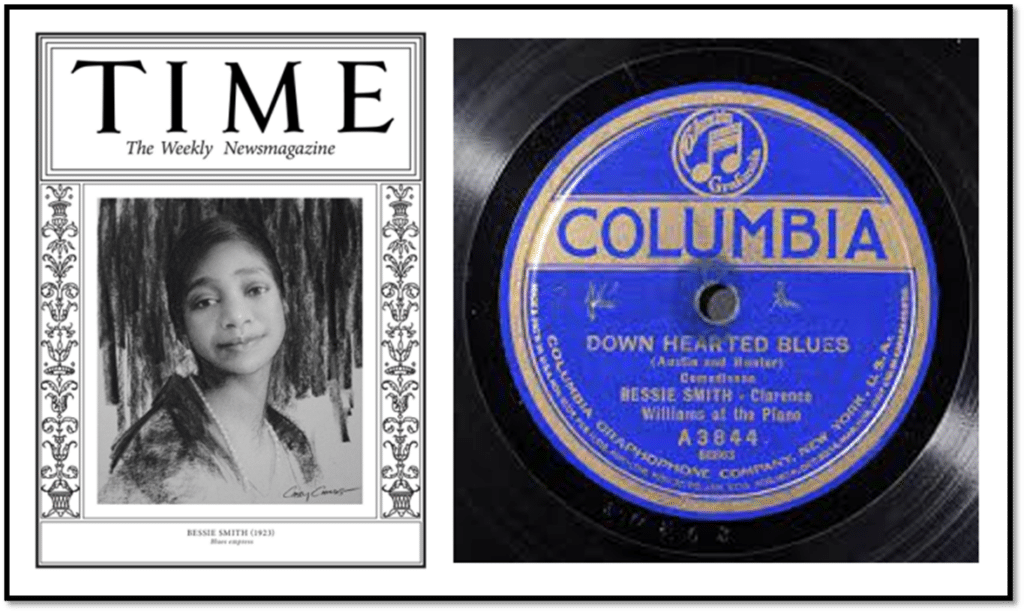
Effect of the Music Modernization Act on Public Domain for Pre-1972 Sound Recordings
The distinction between compositions and recordings is important to remember because these two types of copyrighted works won’t enter the public domain at the same time. The copyright in a musical composition, like most other pre-1978 works, expires after 95 years. However, as a result of 2018’s Music Modernization Act, pre-1972 sound recordings were brought within the scope of federal copyright for the first time. Depending upon when a particular recording was published, Congress added an additional period of protection to the end of the term:
- For recordings first published before 1923, the additional time period ended on December 31, 2021.
- For recordings first published between 1923 and 1946, the additional time period is five years after the general 95-year term.
- For recordings first published between 1947 and 1956, the additional time period is 15 years after the general 95-year term.
- For all remaining recordings first fixed before February 15, 1972, the additional transition period ends on February 15, 2067.
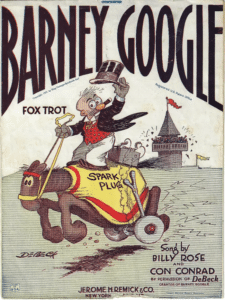
This means that sound recordings first published in 1928 are protected for an additional five years, so they won’t fall into the public domain until 2029 (95 years + additional 5 years = 100 years total). But don’t fret: sound recordings first published in 1923 will enter the public domain on January 1, 2024, as they pass the 100-year mark.
A (Hopefully) Simple Example
As an example, take the classic song “I Wanna Be Loved By You” from the 1928 musical Good Boy. The composition was properly registered and renewed, and will expire at the end of 2023 (95-year term). But the original sound recording embodying the composition (performed by Helen Kane of “Betty Boop” fame) will receive an additional five years of protection per the Music Modernization Act; that copyright won’t expire until 2028. The most well-known version of the song was performed by Marilyn Monroe in 1959’s Some Like It Hot and was released as a sound recording the same year. That copyright won’t expire until February 15, 2067, 108 years after its release. Now are you confused?
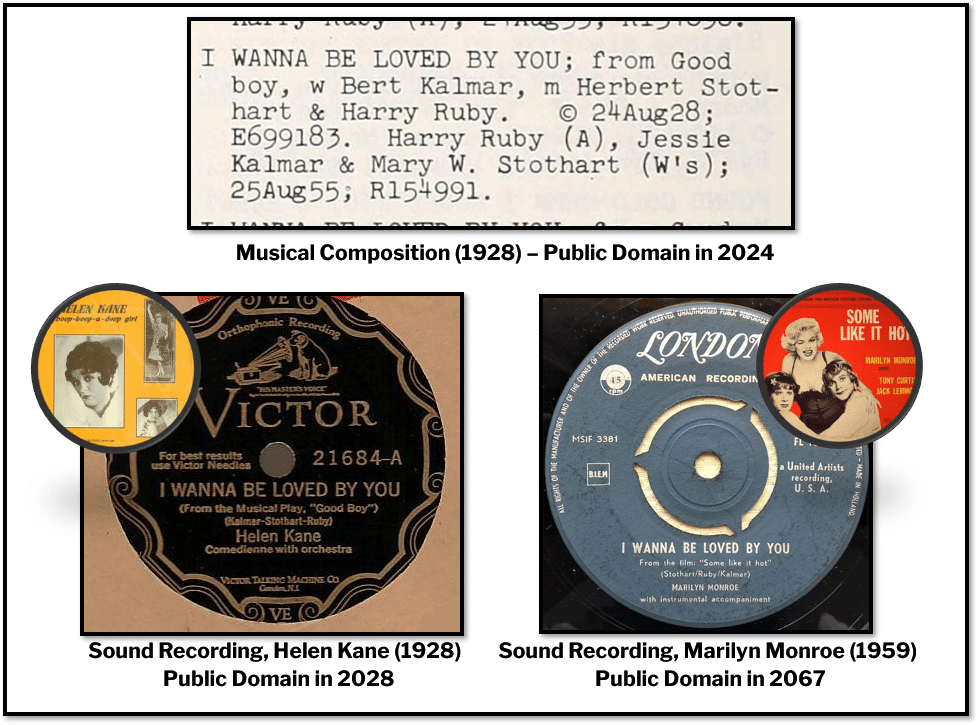
Character Counts
One of the most interesting issues involving older content involves characters that first appear in a public domain work but which then evolve or change over the course of later works still protected by copyright. And yes, now it’s time to talk about Mickey.
Mickey Mouse
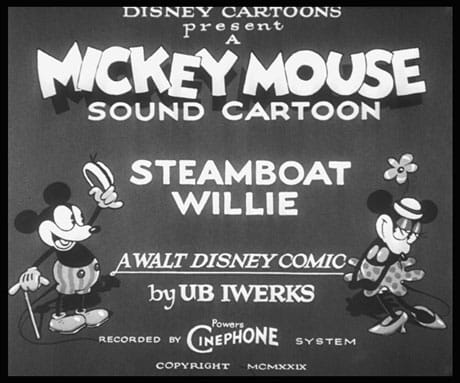
The version of Mickey Mouse featured in Steamboat Willie had black eyes, small ears, and a pointy nose. He also had a bad temper and the unfortunate habit of using barnyard animals as musical instruments.

Over time, Mickey’s eyes were enlarged (and pupils were added), his ears became more pronounced, and his nose was shortened. Following a visit from the ASPCA, he became devoted to animals.
These later versions of Mickey will still be protected by copyright even after the character’s original iteration enters the public domain:
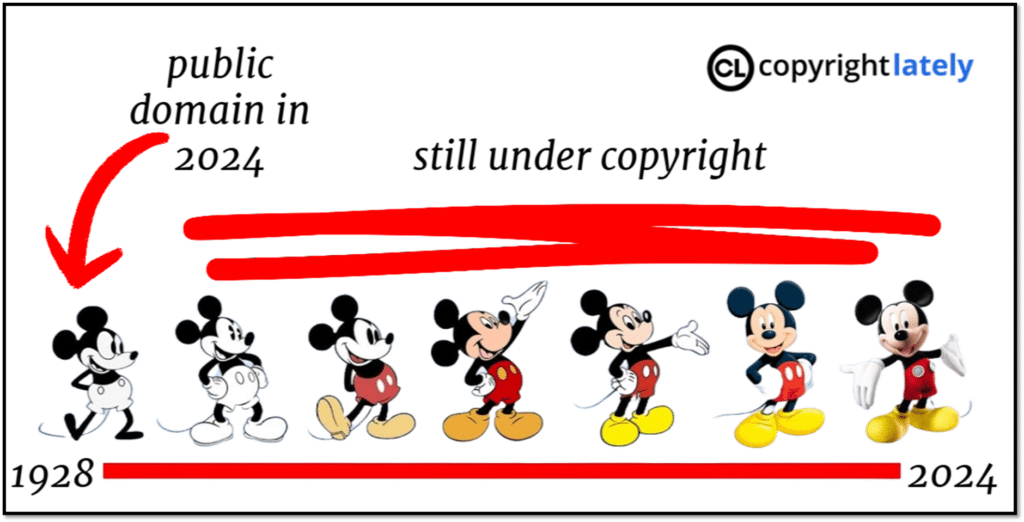
Winnie-the-Pooh
The same is true of Winnie-the-Pooh. The first collection of Pooh stories entered the public domain in 2022, and The House At Pooh Corner will follow in 2024. But Pooh didn’t appear wearing a red shirt until 1932, and Disney didn’t release its first theatrical short featuring the character until 1966. That version of Winnie-the-Pooh won’t enter the U.S. public domain until 2061.

In a case involving the now-public domain Sherlock Holmes, the court in Klinger v. Conan Doyle Estate, Ltd. held that a copyrighted character begins to fall into the public domain when the first published story featuring that character enters the public domain. At this point, “story elements—including characters covered by the expired copyright—become fair game for follow-on authors.” Importantly, however, aspects of the character’s evolution that don’t appear until later works may still be eligible for copyright protection.
Extending Rights in Public Domain Works
There are a few recognized methods that publishers and other rightsholders use to retain market share even after a work has entered the public domain.
New and Improved
First, “special editions” tend to proliferate a year or two before copyright is set to expire, filled with annotations, prefaces, and essays that are still protected by copyright. Films are remastered and repackaged, often with extras not found in the original versions.

Trademark Rights
Another more controversial approach involves using trademarks (which can be perpetual) in characters to extend protection in public domain works. The Supreme Court hasn’t ruled on the precise question, although in 2003, Justice Scalia, writing for the Supreme Court in Dastar Corp. v. Twentieth Century Fox, warned that allowing these types of restrictions on a public domain work could effectively create “a species of mutant copyright law” that would limit the public’s right to copy and use expired copyrights.

As this is an unsettled area of law, it remains to be seen how aggressive Disney will be in enforcing its trademark rights in Mickey Mouse. At the very least, uses that suggest an affiliation or association with Disney risk legal action. In a statement to the Associated Press, Disney confirmed that the company “will work to safeguard against consumer confusion caused by unauthorized uses of Mickey and our other iconic characters.”

As always, I’d love to hear your thoughts in the comments below or on social media @copyrightlately. Meanwhile, here are just some of the notable works that you can copy, distribute, or adapt starting on January 1, 2024:
Notable Films Entering the Public Domain in 2024
- Steamboat Willie, directed by Walt Disney and Ub Iwerks
- Plane Crazy (silent version), directed by Walt Disney and Ub Iwerks
- The Passion of Joan of Arc, directed by Carl Theodor Dreyer, starring Renée Jeanne Falconetti
- The Cameraman, directed by Edward Sedgwick, starring Buster Keaton
- The Circus, directed by and starring Charlie Chaplin
- The Last Command, directed by Josef von Sternberg, starring Emil Jannings (first Academy Award for Best Actor)
- The Singing Fool, directed by Lloyd Bacon, starring Al Jolson (follow-up to The Jazz Singer, which entered the public domain in 2023)
- Street Angel, directed by Frank Borzage, starring Janet Gaynor (first Academy Award for Best Actress)
- Lights of New York, directed by Bryan Foy, starring Helene Costello (first all-talking full-length feature film)
- Show People, directed by King Vidor, starring Marion Davies
- The Man Who Laughs, directed by Paul Leni, starring Conrad Veidt
- Speedy, directed by Ted Wilde, starring Harold Lloyd
- The Circus Kid, directed by George B. Seitz, starring Frankie Darro
- Four Sons, directed by John Ford, starring Margaret Mann
- The Crowd, directed by King Vidor, starring James Murray
- The Wedding March, directed by and starring Erich von Stroheim
- Beggars of Life, directed by William A. Wellman, starring Wallace Beery
- The Patriot, directed by Ernst Lubitsch, starring Emil Jannings
- The Wind, directed by Victor Sjöström, starring Lillian Gish
- The Docks of New York, directed by Josef von Sternberg, starring George Bancroft
Notable Literature Entering the Public Domain in 2024
- The House at Pooh Corner, A. A. Milne (introducing Tigger)
- Tarzan, Lord of the Jungle, Edgar Rice Burroughs
- Peter Pan; or, the Boy Who Wouldn’t Grow Up (play), J. M. Barrie
- Orlando: A Biography, Virginia Woolf
- All Quiet on the Western Front (original German), Erich Maria Remarque
- Lady Chatterley’s Lover, D. H. Lawrence
- The Mystery of the Blue Train (Hercule Poirot, #6), Agatha Christie
- The Threepenny Opera, Bertolt Brecht, Kurt Weill (music)
- The Unpleasantness at the Bellona Club, Dorothy Leigh Sayers
- Decline and Fall, Evelyn Waugh
- Millions of Cats, Wanda Gág (oldest American picture book still in print)
- Point Counter Point, Aldous Huxley
- Meet the Tiger, Leslie Charteris (introduction of “The Saint,” Simon Templar)
- Coming of Age in Samoa: A Psychological Study of Primitive Youth for Western Civilisation, Margaret Mead
- The Well of Loneliness, Radclyffe Hall
- The Trumpeter of Krakow, Eric P. Kelly
- Last Post, Ford Madox Ford
- West-Running Brook, Robert Frost
- The Tower, W. B. Yeats
- The Missing Chums, Hunting for Hidden Gold, and The Shore Road Mystery (The Hardy Boys #4, 5 and 6), Franklin W. Dixon (pseudonymous)
- Mr. Blettsworthy on Rampole Island, H.G. Wells
Notable Musical Compositions Entering the Public Domain in 2024
- “I Wanna Be Loved by You,” w. Bert Kalmar, m. Harry Ruby and Herbert Stothart
- “Sonny Boy,” w. & m. Ray Henderson, Buddy DeSylva and Lew Brown
- “Mack The Knife,” (original German), w. Bertolt Brecht, m. Kurt Weill
- “The Big Rock Candy Mountain,” w. & m. Harry McClintock
- “Empty Bed Blues,” w. & m. J. C. Johnson
- “There’s a Rainbow ‘Round My Shoulder,” w. & m. Dave Dreyer, Billy Rose and Al Jolson
- “Sweet Sue, Just You,” w. Will J. Harris, m. Victor Young
- “West End Blues,” w. & m. Joseph Oliver and Clarence Williams
- “Ramona,” w. L. Wolfe Gilbert, m. Mabel Wayne
- “I Can’t Give You Anything But Love, Baby,” w. Dorothy Fields, m. Jimmy McHugh.
- “Makin’ Whoopee,” w. Gus Kahn, m. Walter Donaldson
Notable Sound Recordings Entering the Public Domain in 2024
- “Down Hearted Blues,” Bessie Smith
- “Barney Google,” Ernest Hare and Billy Jones
- “Dippermouth Blues,” King Oliver’s Creole Jazz Band (w/ Louis Armstrong)
- “Swingin’ Down the Lane,” Isham Jones
- “Bambalina,” The Ray Miller Orchestra
- “No, No Nora,” Eddie Cantor
- “Yes! We Have No Bananas,” Furman and Nash (and several other versions)
- “I’ve Got the Yes! We Have No Banana Blues,” Eddie Cantor
- Waitin’ For the Evenin’ Mail,” Tennessee Ten
- Dreamy Melody,” Shannon Four
- “Who’s Sorry Now?,” Isham Jones
- “St Louis Blues,” W. C. Handy
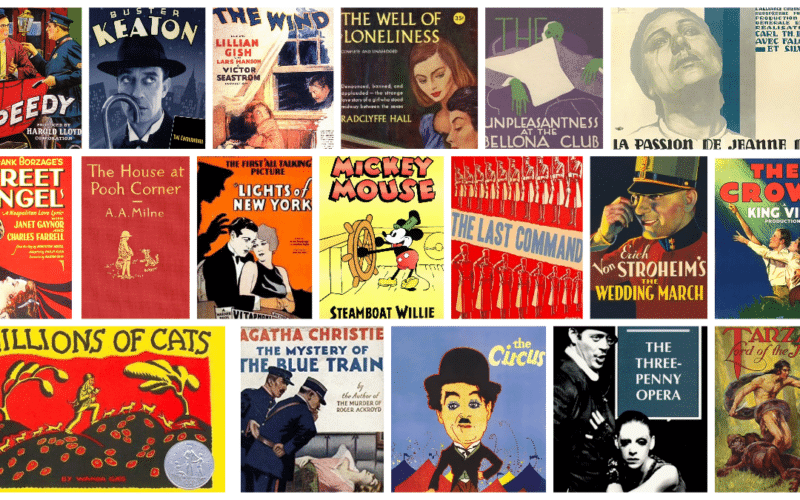

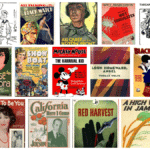
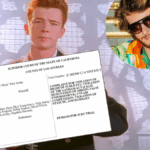
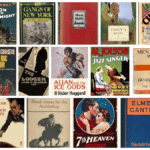



3 comments
Interesting, I had no idea about the specifics of public domain use, and exceptions such as Peter Pan. I had wondered for a while why films come out a year or two before copyright expires when surely it is cheaper to wait, but it makes more sense now.
Perhaps this is the biggest character yet to enter the public domain. I’m very curious to see how Disney will deal with this situation and how it will be used now. So which comics will enter public domain in 2024? I don’t see much talk about comics
Thanks for the detailed run down on copyright complexities!
You inspired a Public Domain Day episode of our Accordion Noir Radio show up here in Vancouver, Canada. All squeezebox records from 1928 (except a 1924 harmonium tune from The Texas Blues Destroyers because it’s great).
We did a similar show last year. Thanks for the reminder!
You can hear this years episode (and last years too) with an annotated playlist at:
https://accordionuprising.wordpress.com/2024/01/04/accordion-noir-radio-playlist-2024-01-03-public-domain-day-1928-2024/